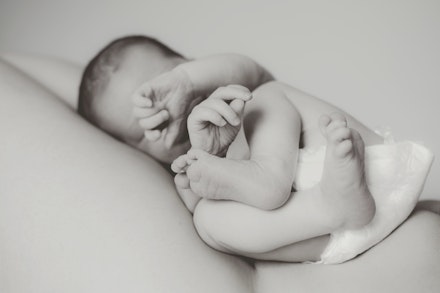What Should My One Week Old Baby Be Doing
The starting time calendar week with your new baby is ane of the nearly overwhelming times, just don't fear, nosotros've discovered everything you need to know nearly that pivotal first week in your new life with your new arrival.What can you look in your baby's get-go week?

1 of 5
1) Lifting their head
Wondering what your babe will exercise this week? It is likely your newborn will elevator their head briefly. But make sure to support their caput at all times.
Don't worry if your newborn doesn't look as expected, the babies on Goggle box are never really one week old. In reality, your baby is likely to be much more wrinkled and squashed after living in a tiny liquid-filled infinite for ix months and squeezing through the birth canal! And then, if your baby's skull looks longer than you lot thought it would, it's completely normal. Plus, her legs and arms will remain in the aforementioned position as they were in the womb and then straighten out over a few weeks. If she seems uncomfortable or fussy, try swaddling her to recreate the feeling within the womb. Newborns are as well prone to swollen genitals and breasts, white spots on their face up and blue-tinted skin. They can likewise be covered in vernix, a white/yellowish waxy substance more common for babies built-in prematurely. At one week erstwhile, your baby volition take instinctive brain function, which is to know how to breathe, feed, sleep, and poo. They won't all the same exist able to fully perceive everything, think properly, remember things, sympathise language or have full physical coordination.How should a one-week-old baby be physically developing?
How should a one-week-old baby be cognitively developing?
What jabs should a one-week-quondam babe have?

A scary idea for whatever parent, only luckily childhood vaccinations don't start until your little 1 is eight weeks old. That said, why not get prepared for that milestone now, here's some advice on how to keep your baby calm during routine vaccinations. Newborns sleep up to 16 to 17 hours a twenty-four hours, but unfortunately for you, it'due south non all at in one case (or when you want it!) Your newborn will typically sleep for two to 4 hours at a fourth dimension through the day and night, making your schedule irregular and tiring. You're likely to exist upwards a lot during the dark to comfort, change or feed them in the get-go few weeks. Read these top tips on dealing with the night feed, from real mums!How much should a 1-week-onetime babe be sleeping?
How much should a i-week-old baby exist eating?

The answer to this depends on whether you've chosen to breastfeed or not. Breastfed babies usually need less milk than formula fed. However, because babies tin can't control their milk intake from the formula, they may vomit if they beverage too much. A good guide for day by twenty-four hours is as follows:
-
Day 1- 7 ml
-
Day ii- xiv ml
-
Twenty-four hour period iii- 38 ml
-
Day 4- 58 ml
-
Day 7- 65 ml
Since information technology's hard to know whether your infant is getting enough to eat as you're getting used to breastfeeding, it'southward useful to expect out for the post-obit signs:How can you tell how much milk your infant is getting when breastfeeding?
-
Your breast should soften during feeds
-
They should be softly swallowing
-
They come off your chest on their ain
-
They seem settled after a feed
-
Their poo goes from being dark to yellow and softer
-
They're wetting their nappy every few hours
Breastfeeding usually lasts about 40 minutes, with your infant switching breasts every five-30 minutes, depending on how long they desire to feed for and how much milk is in each breast. The length of time is null to worry likewise much about, if your baby is latching on and feeding for as long equally they need on each breast they will exist getting all the nutrients they need. Don't fear if you find some weight loss later your baby is born. Past the end of the beginning week, your baby should offset putting on weight again. When it comes to your infant's pooing schedule, y'all'll be happy to know one bowel movement a day is no crusade for concern. Newborns can poo up to x times a 24-hour interval, and so anything between one and 10 and you're within the norm. One might non sound similar enough, but as long as your infant is wetting their nappy five or six times a day, they're getting plenty to eat. That said, if your baby seems uncomfortable or has a bloated abdomen, it'due south best to book an appointment with your GP.How much should a one-week-sometime baby be pooing?
What colour should my newborns' poo exist?

At the primeval stage, your one week old's poo will be thick and dark green due to the meconium that builds up in the intestines during pregnancy. As the days go along, they will expel the meconium and the bowel movements will become more yellow. If you are breastfeeding, the colour also depends on what you're eating or the type, or the formula being fed, plus how hydrated your babe is. Accept a look at our baby poo colour chart for more data. There aren't too many milestones to hit at one week old, as your babe is just virtually getting used to being in the real world. They should be able to know your voice, meet nigh 25cm in front of them and recognise your smell.Milestones of a one-week-old infant
What should parents of a one-week-one-time babe be enlightened of?
-
Breastfeeding: Calendar week one is all near getting to grips with breastfeeding. Nosotros've already spoken about making certain they're getting the correct amount; as far as latching on goes, you may find information technology difficult at first. If you are struggling, recall it does get easier and check out these tips on the best positions to get a proper latch on.
-
Arriving Abode: You're bound to feel every emotion under the lord's day after arriving home with your newborn. The infant blues usually set in after about three days when your milk comes in and causes a new stir of hormones, so you may feel tearful, irritable and wearied despite being elated with your new inflow. Don't worry too much if yous're feeling unsettled, you've just given birth to new life, y'all're bound to be out of sorts. Give yourself a interruption and relax when you can.
-
Postnatal Low: Four in v women experience the baby dejection in the commencement week after giving birth, just many worry it's a sign of something more serious like postnatal depression, therefore information technology'south important to sympathise the differences betwixt infant blues and postnatal depression. Mostly speaking, the infant blues tend to dissipate when your hormones calm down. Then, if you continue to feel depression and overwhelmed for more than a couple of weeks' post-birth, you may want to seek help. You can also develop low prenatally, so if yous were worried, give your doctor a ring. Don't let any feeling of guilt get in the fashion of getting help, postnatal depression affects 1 in 10 women and then there's nothing to exist aback of.
What problems are common with a i-calendar week-old babe?
-
Constipation: Yous may be overly worried about this as you get used to those showtime few nappy changes. Look out for a loss of appetite, crying and discomfort before doing a poo, less than three bowel movements a week or a dry hard poo. If yous notice these things, contact your GP as they are all signs your baby might be constipated.
-
Reflux: Your newborn is bound to spit up straight after a feed, but if information technology becomes excessive or constant information technology may be a sign of reflux. Read all about how to spot and stop reflux here.
-
Hiccups: Common in newborns and babies up to 12 months, hiccups rarely disturb your babe like they exercise adults. In fact, babies tin can even sleep through hiccups. If you exercise want to help get rid of them, attempt burping your baby. Yous only need to seek out a doctor if your infant's hiccups appear to upset them.
-
Peel peeling: This can start before yous even go out the hospital and is completely normal. Your infant has been covered in amniotic fluid, claret, and vernix, so in one case the vernix has been wiped away by a nurse your infant will begin to shed the outer layer of their skin. The amount varies depending on how much vernix covered them during nativity, the more they had the less they peel, which changes according to when y'all deliver - premature babies tend to have more vernix.
-
Cross-eyed: This is super normal, as your baby is still learning how to work her optics and is unable to focus properly on annihilation more than 25cm away. It can also be due to epicanthal folds, skin on the eyelid, which usually disappear inside a year.
-
Fussy: Making the huge adjustment from living inside the womb to out in the world, babies are bound to be fussy in the start calendar week. Whether information technology'south problem latching on or general discomfort, information technology'south completely natural for your baby non to settle straight away.
-
Jaundice: Your baby's pare and eyes may appear yellow in the first few days of being born, this is mutual and nothing to worry about.
-
Eyes rolling dorsum: This is common in babies that are sleepy, which your one week onetime will be all the time. As they try to fall asleep or wake, you may notice their eyes rolling back nether drooping eyelids. Don't worry, it's normal in this state of drowsiness.
-
Middle belch: Your baby's eyes may appear sticky because the tear ducts in newborns are normally narrower and allow for accumulated tears to block them, making them wait sticky when they dry. If this isn't excessive, it is a normal issue and you tin can clean your infant's eyes softly with cotton wool and water that has been sterilised by boiling and then allowing to cool. Ensure your easily are make clean and yous apply a new piece of cotton wool for each center to prevent causing infection. If the discharge is excessive or becomes xanthous/dark-green, or your baby'southward eyes expect red or swollen, contact your GP.
We asked Dr. Ellie Cannon, GP, mum of ii and author of Go on Calm: The New Mum's Transmission for her superlative tips when it comes to your baby's first week of life.Ask the expert: Surviving week ane with your new baby:
-
Survive the nights: Don't panic, ane day your baby WILL sleep through the nighttime. Help your baby differentiate between night and day by keeping night quiet, dim and with minimal interaction. Day means light, noise, and interaction. It's also important to become outdoors in the twenty-four hour period as natural light volition assistance regulate your baby's body clock.
-
Keep an eye on hydration: If yous feel like your baby isn't feeding well, it'south ever a good idea to go him checked by a professional. A infant can become dehydrated in a matter of hours if he's got a fever, is vomiting or has diarrhoea.
-
Leave the umbilical-cord stump alone: The stump of your baby'due south umbilical cord should be left to fall off by itself. This normally happens betwixt five and fifteen days after birth, but information technology volition dry out and plough black get-go. Yet tempting it might be, don't pick at it!
-
Green poo is fine: In the get-go calendar week of your infant's life, you will see the colour of his poo change. It starts off black and sticky and, as he starts to drink and digest milk, it goes a greenish color and then turns yellow.
-
Feet at the foot of the cot: The safest way for a baby to sleep is on his back, with his feet at the human foot of the cot or Moses basket, so he tin can't slip under the covers.
-
Swaddle: It helps to make the baby experience secure. Ask your midwife to teach you how.
-
Don't fret over the heel-prick test: When your babe is five days old, he'll have the heel-prick test. These four drops of blood are taken to be tested for certain conditions, which are all very rare and then don't worry.
Have me to week ii! Your baby week by week
Merely and so yous know, whilst we may receive a commission or other compensation from the links on this website, we never permit this to influence production selections - read why yous should trust united states
Source: https://www.motherandbaby.co.uk/baby/development/1-week-old-baby-development/





0 Response to "What Should My One Week Old Baby Be Doing"
Post a Comment